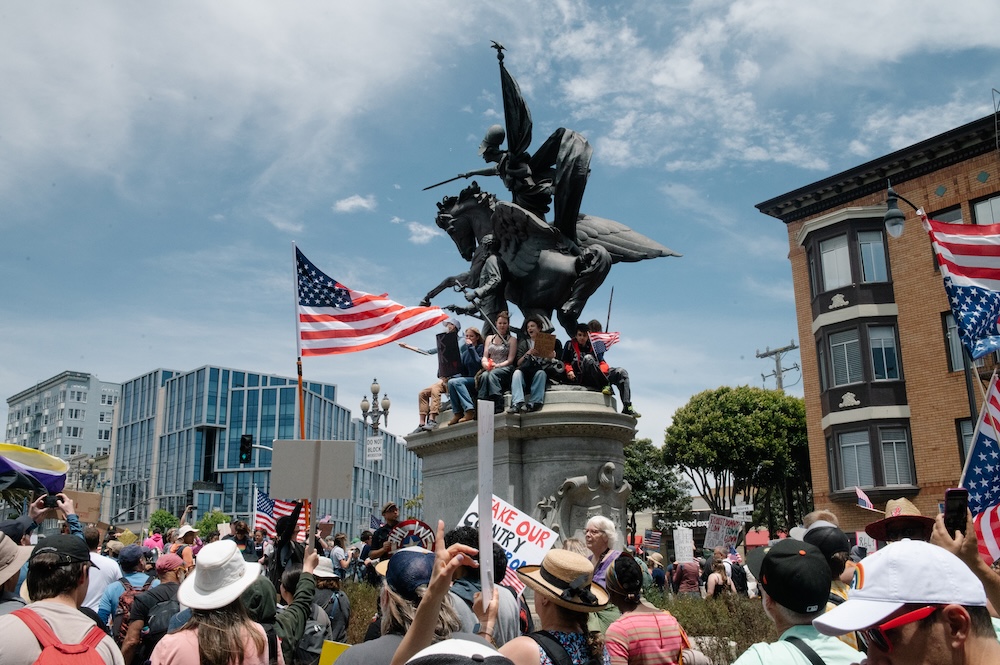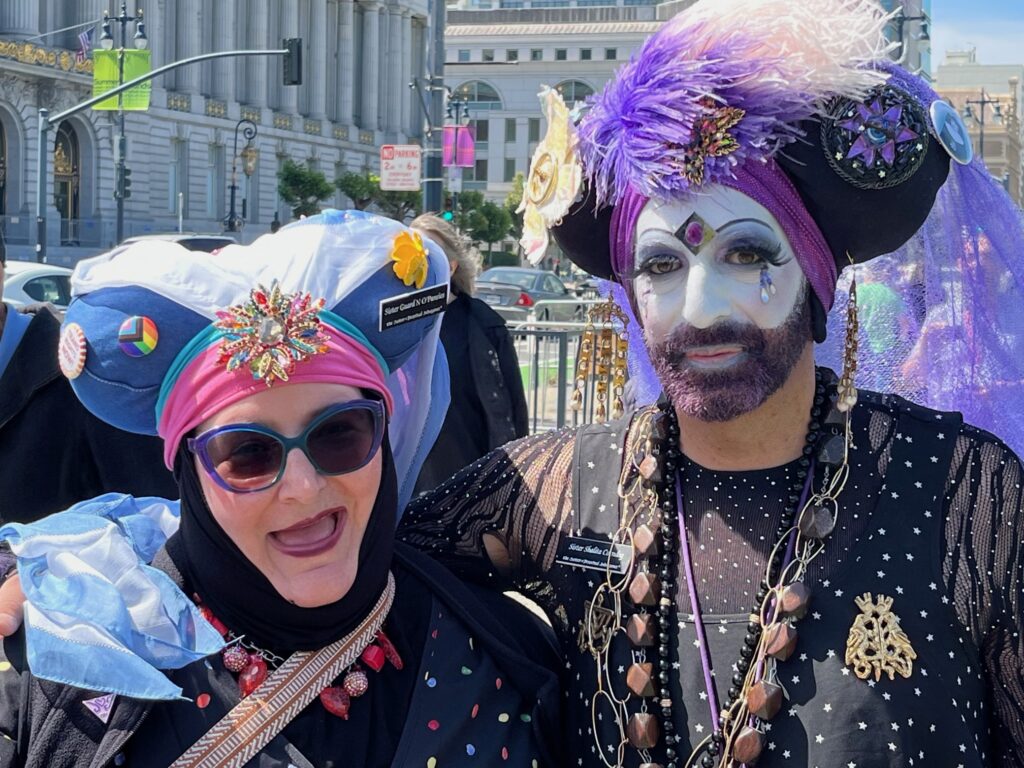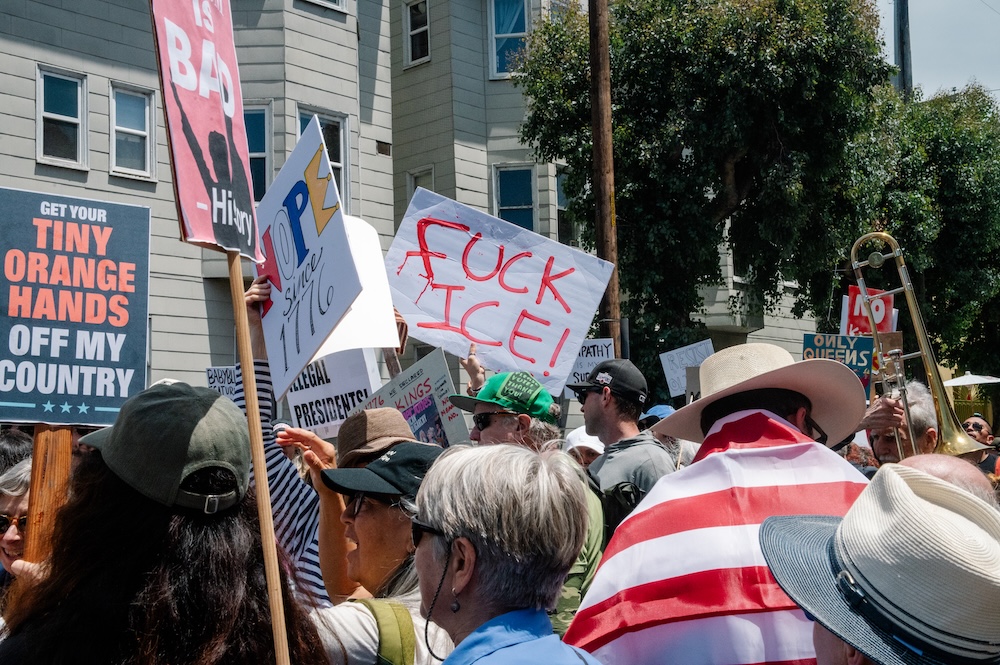It was a beautiful day for a protest in San Francisco, and while even the cops on duty told me it was “too big to count,” I think it’s safe to say more than 50,000 people were in the streets Saturday. The first marchers were all the way at Civic Center before the last even left Dolores Park.
The feeling in SF—and in a lot of cities around the country—was festive. As I rode my bike along Valencia St. after the event, the cafes and bars were packed; people were celebrating community.
We could have predicted that would happen in this city—but the amazing thing was that big protests were happening all over the country, including in places were Trump won. I saw a Facebook post from my friend Stephen Zunes reporting 7,000 people marching in conservative Traverse City, Michigan. That’s almost half the population of the town.

By some estimates, more than 10 million people were in the streets in more than 2,000 cities and towns.
The news of the protests almost drowned out the news of Trump’s military parade (except on Fox News, which essentially ignored the protests, since they couldn’t seem to find anything bad to say, and focused on the Trump parade, which the UK Guardian said was, in the end, “underwhelming.”)

Gabriel Haaland alerted me on Facebook to this Harvard study, which concludes that no authoritarian government has withstood 3.5 percent of the population mobilizing against it in a peak event. From Haaland:
I have frequently read that 3.5 percent of the population is needed to successfully challenge a fascist regime.
That works out to be about 12.1 million people based on the current U.S. population.
Current estimates are that 12 million people protested yesterday. It is not insignificant that Trump’s simultaneous parade is widely perceived to be a disaster.
While the tragic event in Minnesota was extremely chilling, the fact that 80,000 people showed up in Minneapolis says everything about the resilience and courage of people in this movement for change.
I believe that we will win.
If everyone who showed up in the streets today votes against Republicans in the midterms—and a Democratic majority in the House and Senate is willing to stand up for democracy—it will be the effective end of the Trump dictatorship.

The budget discussions continue Wednesday/18, with the Budget and Appropriations Committee hearing from these departments:
Asian Art Museum City Attorney, Office of the Treasurer and Tax Collector, Office of the Assessor/Recorder, Office of the Fine Arts Museum Arts Commission War Memorial Human Resources, Department of Ethics Commission Technology, Department of Planning Department Elections, Department of Retirement System General City Responsibility Controller, Office of the City Administrator, Office of the Public Works Mayor’s Office/Housing and Community Development Public Health, Department of Board of Supervisors
The committee will meet again Friday, to hear from departments that the members are calling back for more information. The committee won’t be taking public comment those days.
The final day for public comment on the budget is Monday/23—and that’s going to be a huge, long day. I suspect more than 2,000 will descend on City Hall for rallies, and the line for public comment will stretch across the second floor. The Lurie budget has created massive public outrage.
By that day, we should have some sense of what the Budget and Appropriations Committee has negotiated with the Mayor’s Office, and what the final brutal cuts will look like. And it will be brutal: The supes typically manage to change about 1 percent of the total General Fund budget.
In this case, the easiest fix is to release the more than $300 million the mayor is setting aside to cover the potential loss of a lawsuit by Airbnb and other tech companies over business taxes. The city, could, ultimately, lose that suit—but if the City Attorney’s Office fights it all the way, a San Francisco jury would have to side with Big Tech over the needs of the city. And there’s no way that case would go to trial in the next year, maybe not the next two.
By July, we will see the real test: Who on the committee and the full board is going to vote for this?
At the Haight Ashbury Neighborhood Council meeting Thursday, Anya Worley-Ziegmann, who works with the People’s Budget Coalition, said that if this budget passes largely unchanged, “we need to let them know we will never forget what they did.”





